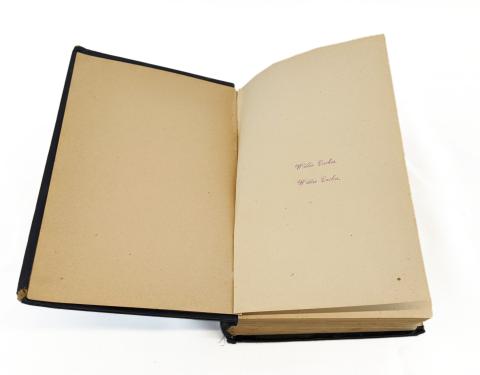
Annotations from the Archive: Association Copies
The National Willa Cather Center’s archives contain numerous book collections, and scattered throughout them are some of our most precious and valuable archival objects: our association copies. Coming from many different collections, our association copies help us—and by extension, Cather readers and researchers—understand Willa Cather’s relationships with her readers, her family and social networks, and the larger literary and publishing world.
An “association copy” is a broad term used by book collectors and archivists to describe several different types of books. In general, an association copy was owned, at some time, by someone who was “associated” with the book, in a variety of ways. Our association copies include:
- Books owned by Willa Cather
Willa Cather’s personal copy of her 1903 book of poetry, April Twilights, falls in this category. It includes emendations and typescript additions that are reflected in the 1923 edition of the book. The Cather Family Library, which will be discussed at length in a later Annotations, contains a number of books personally owned by Willa Cather, such as the family copy of Pilgrim’s Progress (pictured), which Cather repeatedly mentions in letters, interviews, her early journalism, and in her fiction (“Old Mrs. Harris” and One of Ours). - Books owned by people associated with the production of a Cather book
A recently acquired book was owned by the printer of Obscure Destinies. The book is inscribed to George Stimson by Willa Cather and encloses a letter about her satisfaction with his work on producing the edition. - Books owned by those closely connected to Willa Cather
An especially nice association copy from the Southwick Rare Book Collection is a copy of Shadows on the Rock, inscribed by Cather to her mother, who was an invalid in a nursing home in California at the time of publication. The inscription reads, "For dear Mother, Mary Virginia Cather, who was so patient while I worked on this book. Willa Cather." A note discovered with the book reinforces the association. - Books owned by someone related to a Cather book’s content
Because six of Cather's twelve novels and many short stories utilized people, places, and events from Red Cloud's early days, many of our collected books could be included in this category. We have, for example, a large collecting of books owned by Jack Cather, Willa Cather's youngest brother, the namesake for “Jack-a-Boy.” A copy of Death Comes For the Archbishop inscribed by Willa Cather to her father Charles also would be included in this category. Though the novel concerns itself with the history of the Catholic church in early New Mexico, Charles Cather's travels to the American Southwest—and the journal he kept about that trip—was an early inspiration. Judging by her inscription, a young Willa Cather clearly remembered her father's thrilling stories of Colorado and New Mexico. - Books owned by someone connected tangentially to a Cather book’s content
A personal copy of Youth and the Bright Medusa, belonging to Henry Goddard Leach, who became an influential editor and leader in writing circles. As the editor of The Forum, Leach managed the serial publication of Death Comes For the Archbishop several years later. But Leach's copy of YBM, from our Richard Giannone Collection, dates from a time early in Leach's career; he was the editor of The American-Scandinavian Review.
It’s worth clarifying that some books owned or given by Willa Cather are not association copies. For example, presentation copies are books given by the author that have no connection to the content or production of the book.
Another example of a book that is not an association copy is a book from the author’s library, again without any connection to the author’s work. The Cather Family Library, for instance, contains association copies as well as books that aren’t apparently relevant to Willa Cather’s writing life. These books may have belonged to other members of the family, but even if they were owned or read by Willa Cather herself, without a link to her published work, this type of volume would not be considered an association copy.
You can view our book collections in person by making an appointment to visit the archives.
